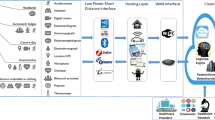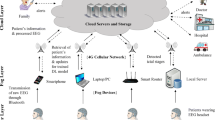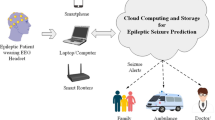Abstract
The Internet of Things (IoT) has evolved from a network of embedded computer devices to a network of brainy sensors. With the advent of IoT-cloud technologies, however, there is a growing demand for a cognitive framework that can deliver affordable, high-quality smart healthcare with a focus on the discrete patient. The advent of AI and deep learning methods makes it possible to include human-level reasoning into intelligent healthcare infrastructure. To evaluate the healthcare system, we also present a deep learning approach for detecting (Electroencephalography) EEG seizures. Extracting features from produced modal data, fusing multimodal feature maps, and determining whether or not the EEG signals have seizure are the separate responsibilities of the Multimodal Convolutional Neural Network (MMFCNN)’s three blocks. In addition, the study suggests a unique attention method, i.e., the cross-attention mechanism, to realise the information interaction and emphasise more representative info during the feature extraction stage. The study records and transmits EEG signals from epileptic patients using smart EEG sensors (in addition to general healthcare smart sensors). The cognitive framework then makes a judgement in the here-and-now regarding future actions and whether or not to submit the data to the deep learning unit. The suggested system detects the patient’s condition based on the latter’s actions, gestures, and facial expressions. Using a likelihood score, signals are processed and sorted into seizure and non-seizure categories in the cloud, where seizures are also detected. Those involved in a patient’s care receive the data so that they can keep tabs on them and, in emergency situations, take decisive action. The suggested model achieves 99.2% accuracy in experiments, as shown by the results.





Similar content being viewed by others
References
Abdel-Basset M, Ding W, Abdel-Fatah L (2020) The fusion of Internet of Intelligent Things (IoIT) in remote diagnosis of obstructive Sleep Apnea: a survey and a new model. Inf Fus 61:84–100
Alanazi SA, Kamruzzaman MM, Alruwaili M, Alshammari N, Alqahtani SA, Karime A (2020) Measuring and preventing COVID-19 using the SIR model and machine learning in smart health care. J Healthcare Eng
Alhussein M, Muhammad G, Hossain MS, Amin SU (2018) Cognitive IoT-cloud integration for smart healthcare: case study for epileptic seizure detection and monitoring. Mobile Networks and Applications 23:1624–1635
Al-Khafajiy M, Otoum S, Baker T, Asim M, Maamar Z, Aloqaily M, Randles M (2021) Intelligent control and security of fog resources in healthcare systems via a cognitive fog model. ACM Trans Internet Technol (TOIT) 21(3):1–23
Alshehri F, Muhammad G (2020) A comprehensive survey of the Internet of Things (IoT) and AI-based smart healthcare. IEEE Access 9:3660–3678
Amin SU, Hossain MS, Muhammad G, Alhussein M, Rahman MA (2019) Cognitive smart healthcare for pathology detection and monitoring. IEEE Access 7:10745–10753
Anter AM, Abd Elaziz M, Zhang Z (2022) Real-time epileptic seizure recognition using Bayesian genetic whale optimizer and adaptive machine learning. Futur Gener Comput Syst 127:426–434
Bharadwaj HK, Agarwal A, Chamola V, Lakkaniga NR, Hassija V, Guizani M, Sikdar B (2021) A review on the role of machine learning in enabling IoT based healthcare applications. IEEE Access 9:38859–38890
Bhardwaj V, Joshi R, Gaur AM (2022) IoT-based smart health monitoring system for COVID-19. SN Comput Sci 3(2):137
Braik MS (2021) Chameleon swarm algorithm: a bio-inspired optimizer for solving engineering design problems. Expert Syst Appl 174:114685
Espinoza C, Martella D (2023) Cognitive functions in COVID-19 survivors, approaches strategies, and impact on health systems: a qualitative systematic review. Eur Archives Psychiatry Clin Neurosci 1–45
Gupta, A. K., Chakraborty, C., & Gupta, B. (2020). Sensing and monitoring of epileptical seizure under IoT platform. In Smart medical data sensing and IoT systems design in healthcare (pp. 201–223). IGI Global.
Ioffe S, Szegedy C (2015) Batch normalization: accelerating deep network training by reducing internal covariate shift. In: Proceedings of international conference on machine learning. vol. 37, pp. 448–456
Korenevskiy NA, Al-kasasbeh RT, Shawawreh F, Ahram T, Rodionova SN, Salman Alshamasin M, Ilyash M (2023) Prediction of operators cognitive degradation and impairment using hybrid fuzzy modelling. Theoretic Issues Ergon Sci 24(3):359–384
Kumar MA, Vimala R, Britto KA (2019) A cognitive technology based healthcare monitoring system and medical data transmission. Measurement 146:322–332
Masud M, Muhammad G, Alhumyani H, Alshamrani SS, Cheikhrouhou O, Ibrahim S, Hossain MS (2020) Deep learning-based intelligent face recognition in IoT-cloud environment. Comput Commun 152:215–222
Muhammad G, Hossain MS (2021) Emotion recognition for cognitive edge computing using deep learning. IEEE Internet Things J 8(23):16894–16901
Muhammad G, Alshehri F, Karray F, El Saddik A, Alsulaiman M, Falk TH (2021) A comprehensive survey on multimodal medical signals fusion for smart healthcare systems. Inf Fus 76:355–375
Nasser N, Emad-ul-Haq Q, Imran M, Ali A, Razzak I, Al-Helali A (2021) A smart healthcare framework for detection and monitoring of COVID-19 using IoT and cloud computing. Neural Comput Appl 1–15
Rizk DKAA, Hosny HM, ElHorbety S, Salem AB (2022) Smart hospital management systems based on Internet of Things: challenges, intelligent solutions and functional requirements. Int J Intell Comput Inf Sci 22(1):32–43
Sadoughi F, Behmanesh A, Sayfouri N (2020) Internet of things in medicine: a systematic mapping study. J Biomed Inform 103:103383
Singh N, Raza M, Paranthaman VV, Awais M, Khalid M, Javed E (2021) Internet of Things and cloud computing. In: Digital Health (pp. 151–162). Academic Press
Skopp NA, Kaplan DA, Todd BL, Drell MB, Pratt KM (2022) Pilot outcomes of cognitive processing therapy implementation in military health system outpatient behavioral health clinics. Psychol Serv
Sodhro AH, Sennersten C, Ahmad A (2022) Towards cognitive authentication for smart healthcare applications. Sensors 22(6):2101
Uslu BÇ, Okay E, Dursun E (2020) Analysis of factors affecting IoT-based smart hospital design. J Cloud Comput 9(1):1–23
Vedanarayanan V, Arulselvi G, Poornima D (2021) Cognitive intelligent healthcare (CIH) framework by integration of IoT with machine learning for classification of electroencephalography (EEG). Adv Prognost Predict Modell Healthcare Data Analyt 107–127
Xu H, Ye N, Liu G, Zeng B, Liu S (2021) FINet: Dual branches feature interaction for partial-to-partial point cloud registration. arXiv:2106.03479
Zhang Y, Chen Y, Yang W, Yu H, Lv Z (2022) Human-centered intelligent healthcare: explore how to apply AI to assess cognitive health. CCF Trans Pervas Comput Interact 4(3):189–206
Ziyad SR, Ziyad A (2021) Emergency rapid response to epileptic seizures-a novel IOT framework for smart cities. Scalable Comput Pract Exper 22(2):259–272
Author information
Authors and Affiliations
Corresponding author
Additional information
Publisher's Note
Springer Nature remains neutral with regard to jurisdictional claims in published maps and institutional affiliations.
Rights and permissions
Springer Nature or its licensor (e.g. a society or other partner) holds exclusive rights to this article under a publishing agreement with the author(s) or other rightsholder(s); author self-archiving of the accepted manuscript version of this article is solely governed by the terms of such publishing agreement and applicable law.
About this article
Cite this article
Aluvalu, R., Aravinda, K., Maheswari, V.U. et al. Designing a cognitive smart healthcare framework for seizure prediction using multimodal convolutional neural network. Cogn Neurodyn (2024). https://doi.org/10.1007/s11571-023-10049-x
Received:
Revised:
Accepted:
Published:
DOI: https://doi.org/10.1007/s11571-023-10049-x




